A Second World War veteran wanted to celebrate his 100th birthday by having a drink with his grandson.
And the setting was perfect for Ed Nelson, as his grandson Carl Dadson is the landlord of a pub which bears his name - The Nelson Arms in Castle Street, Farnham.
After being toasted by his grandson, with Lord Nelson looking on from the walls of the pub, Ed said: “I get free beer here - I’m helping to drink Carl’s profits!”
Ed received 100th birthday cards from his family, the Royal Artillery, and King Charles and Queen Camilla.
Assuring the Herald he was having a lovely birthday, Ed revealed he had a surprise caller.
He said: “My dentist phoned this morning, not to talk about my teeth but to say happy 100th birthday. I’m his oldest patient!”
Although still living independently, Ed said the first thing he felt about being 100 was “old”, adding with a smile: “I can’t run about as I used to.”
When asked how he had managed the grand achievement of becoming a centenarian, modest Ed did not attempt to offer any pearls of wisdom, simply admitting “I don’t know!”.
That modesty is reflected in Ed’s attitude to wearing his war medals. Carl said his 100th birthday was the first time he had done so, and explained how he had encouraged his grandfather to show them off on his big day.
Ed’s daughter Caroline Dadson said: “When we were talking about Dad’s 100th birthday, we asked him did he want a party, did he want to go out for a meal.
“But he said ‘the only thing I really want to do for my 100th birthday is to go to the pub and have a drink with Carl’ - so that’s what we did.”
Carl, who has run The Nelson Arms since 2018, said his family had always had an interest in the hero of Trafalgar.
Ed, whose father was in the Royal Navy, was born in Stamshaw in Portsmouth - and he did not waste any time in introducing his grandson to the city’s most famous attraction.
Carl said: “He took me on HMS Victory about 30 years ago. Now to be able to drink in our pub, with some of Lord Nelson’s history around you, and your surname above the door, has a lot of meaning to it.”
After being entertained by his grandson, Ed went to his granddaughter Catherine’s house for a family party.
Redvers Hereward Nelson - “call me Ed, keep life simple” - was born on December 16, 1924. Despite the legal age to enrol for war duty being 18, Ed enlisted on February 11, 1941, aged just 16.
He insisted on joining his older brother to help fight for his country, so lied about his age. He was only 5ft 4in tall, weighing just 8st 4lb, but was 5ft 8in tall when the war ended.
Ed joined the Infantry Regiment of the Army and underwent his initial military training in Warwickshire. After completing training, Ed left Liverpool, a major port for military personnel during the war, on the troopship SS Maloja as part of Operation Torch.
Operation Torch was the code name for the Allied invasion of north Africa, which began in November 1942. It was a major part of the effort to push Axis forces out of Africa and establish a foothold in the Mediterranean.
The British 1st Army was part of the invading Allied forces under the command of General Sir Harold Alexander. This operation was crucial in securing north Africa, paving the way for the Allied invasion of Europe.
In 1943 Ed was involved in two key aspects of the Italian Campaign, starting with the Battle of Ortona.
This was a significant and intense urban battle between Canadian and German troops in the town of Ortona from December 20 to 28, part of the larger Allied effort to secure Italy after the invasion of Sicily and the Italian mainland.
Canadian regiments, particularly the Royal Canadian Army, played a major role, engaging in house-to-house fighting against well-entrenched German forces. Ed contributed to the fight as part of artillery support operations.
The battle was brutal and costly, with heavy casualties, but the Canadians ultimately captured the town.
An explosion took off the top of Ed’s left forefinger and thumb. He was taken to hospital with protruding bones, which were sawn down and skin grafted. After a short stay in hospital he declined to be sent home and returned to the war.
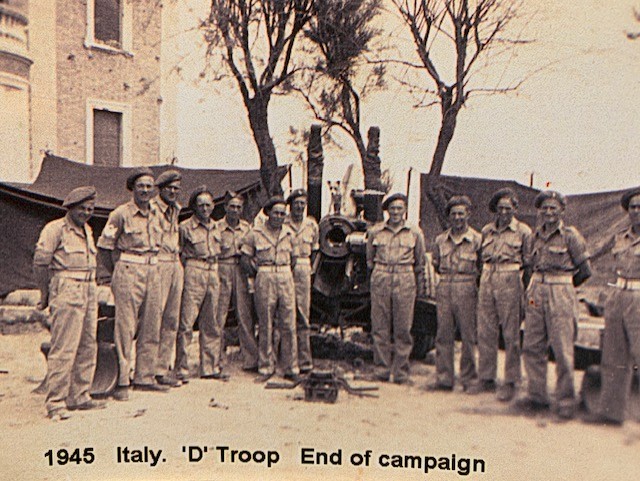

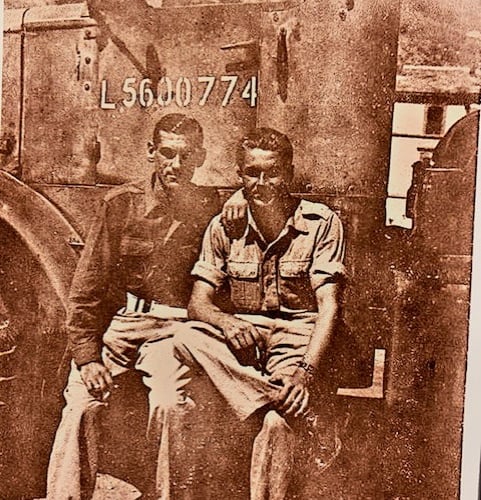
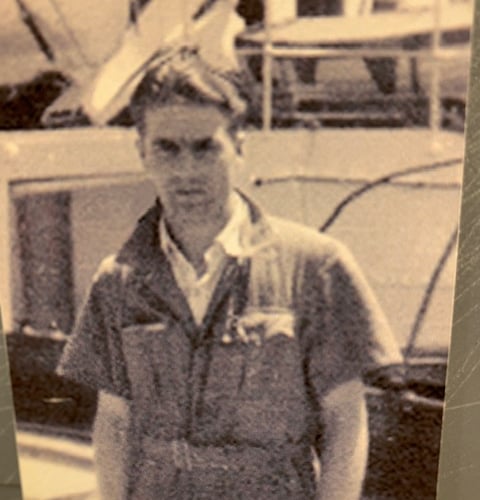
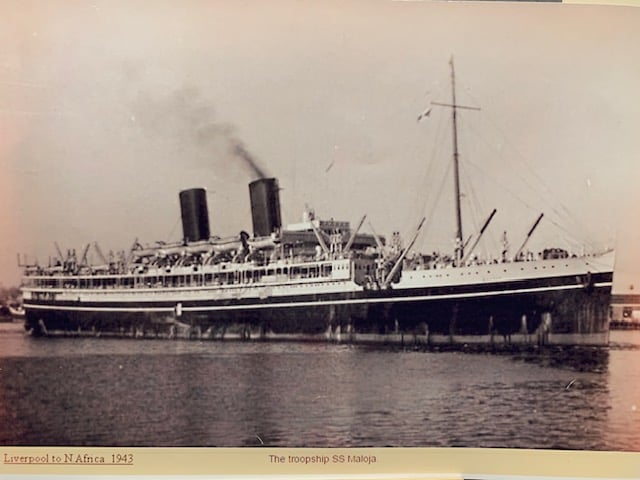
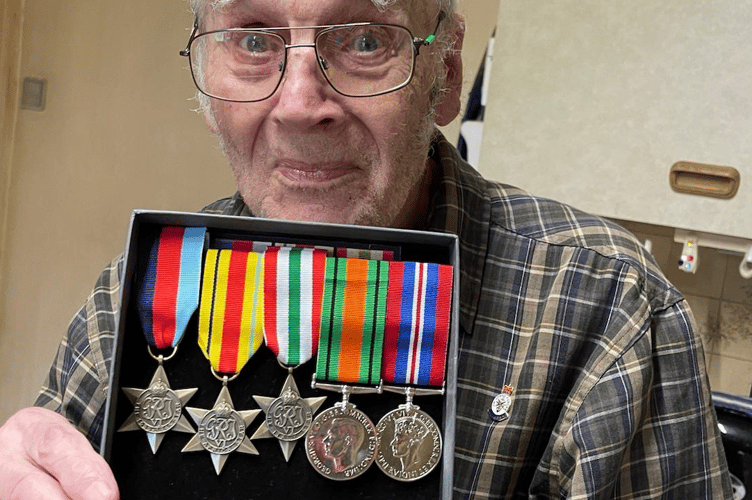
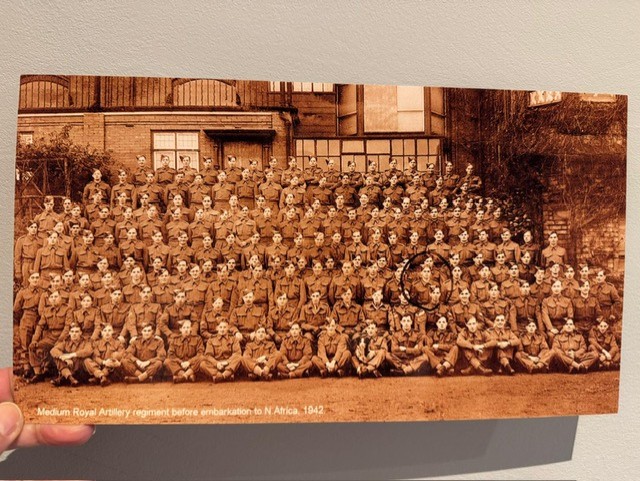
After the Battle of Ortona, Ed stayed in Italy with the 17th Medium Regiment, Royal Artillery, a part of the British 8th Army which provided medium artillery support throughout the Italian Campaign.
Medium Artillery played a critical role in softening up enemy positions, supporting infantry advances and providing counter-battery fire against German artillery.
Ed’s work with this regiment would have involved maintaining and repairing the medium and heavy artillery pieces used in these operations. This placed him in key operational roles during this crucial phase of the war, contributing to the eventual Allied success in Italy.
He received five war medals for services to his country.
The Africa Star Medal was awarded to military personnel who served in the North African Campaign from June 10, 1940, to May 12, 1943. This involved key battles in north Africa, where Allied forces fought against Axis forces led by Germany and Italy.
The Italy Campaign Medal, or Italy Star, was awarded to soldiers who served in the Italian Campaign. This involved a series of military operations from 1943 to 1945 as Allied forces fought to liberate Italy from Axis control.
The 1939-1945 Star, or Second World War Star Medal, was awarded to members of British and Commonwealth forces who served in the war. It recognises those who contributed to the war effort in a variety of ways, including in combat and support roles.
The War Medal 1939–1945 was a campaign medal instituted by the UK on August 16, 1945, for Commonwealth citizens who served full-time in the armed forces or merchant navy for at least 28 days between September 3, 1939, and September 2, 1945.
The Defence Medal was a British campaign medal awarded to military and civilian personnel who served in roles essential to the defence of the UK. It recognised those who contributed to the war effort through service in home defence, civil defence and other vital operations.
Ed also received the Veteran's Badge, awarded to those who served in the armed forces to acknowledge their contribution and sacrifice in military service.
His family said: “Ed feels he was very lucky to survive the horrors of war as so many of his friends and comrades did not return.
“His milestone birthday marks a significant and inspiring life, especially given the history and personal experiences he would have witnessed over the years.
“As a centenarian, he experienced not only the challenges and triumphs of his military service but also the profound changes in the world across a century.”

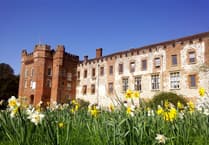



Comments
This article has no comments yet. Be the first to leave a comment.